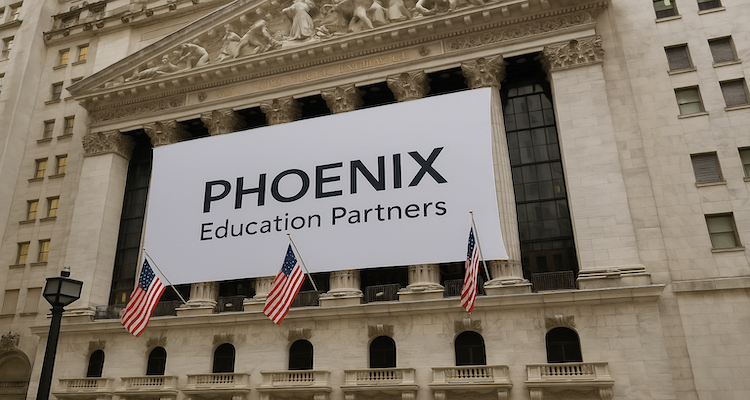Phoenix Education Returns to Wall Street with $136 Million IPO

Phoenix Education Partners, owner of the University of Phoenix, raises $136 million in its long-awaited IPO, signaling renewed investor optimism in the U.S. public markets.
A Comeback Eight Years in the Making
Phoenix Education Partners, the parent company of the University of Phoenix, has officially re-entered the public market after more than eight years. On Wednesday, the company priced its U.S. initial public offering (IPO) at $32 per share right in the middle of its targeted range raising $136 million and valuing the firm at approximately $1.14 billion.
This marks a major comeback for one of America’s most well-known for-profit education providers, which was taken private in 2017 following years of controversy and financial challenges.
Inside the IPO: A Strategic Reentry
The offering included 4.25 million shares, jointly sold by private equity backers Apollo Global Management and Vistria Group, at a per-share price of $32 slightly above the low end of the $31–$33 target range.
Apollo Global, which offloaded 3.55 million shares, will maintain majority voting control even after the listing. Shares are set to begin trading on the New York Stock Exchange under the ticker symbol “PXED” on October 9.
The IPO, managed by a syndicate of major investment banks including Morgan Stanley, Goldman Sachs, BMO Capital Markets, and Jefferies marks one of the most anticipated education-sector listings in recent years.
Market Timing: A Fragile Revival for IPOs
Phoenix Education’s public debut comes amid cautious optimism for the U.S. IPO market. After months of slowdown driven by global trade tensions and economic uncertainty, investor confidence appears to be creeping back.
However, the recovery faces fresh headwinds. The ongoing U.S. government shutdown has partially suspended operations at the Securities and Exchange Commission (SEC), delaying review processes for several pending IPOs. Despite that, Phoenix’s listing is seen as a test case for whether institutional investors are ready to embrace risk again in a still-volatile economy.
From Private Ownership to Public Stage
Phoenix Education’s journey has been complex. Its predecessor, Apollo Education Group, was taken private in 2017 for $1.1 billion through a consortium led by Apollo and Vistria. That move came amid mounting scrutiny over the University of Phoenix’s marketing tactics and student outcomes.
In 2023, a nonprofit entity affiliated with the University of Idaho attempted to acquire the University of Phoenix for $550 million. However, the deal collapsed earlier this year after facing political and regulatory pushback.
A Legacy of Reinvention
Founded in 1976 by academic entrepreneur John Sperling, the University of Phoenix became synonymous with online higher education, particularly for working adults seeking flexible learning paths.
Over decades, it has served hundreds of thousands of students through its online degree and certificate programs tailored toward professional advancement. Yet, its reputation took a hit in 2019 when the institution settled with the Federal Trade Commission (FTC) over allegations of misleading advertising. The university had allegedly promoted fake partnerships with top U.S. companies to attract students a case that ended with a $50 million settlement and $141 million in student debt forgiveness.
Expert Views: A Cautious Optimism
Market analysts say Phoenix Education’s IPO represents both an opportunity and a risk. “The company’s return to the market suggests investors are cautiously optimistic about the future of online education,” noted one financial analyst familiar with the offering. “But it’s also a reminder that the sector still carries the baggage of its for-profit past.”
While Phoenix Education has pivoted toward more transparent operations and outcome-driven programs, investor sentiment will likely hinge on how it differentiates itself from both public universities and newer online learning platforms such as Coursera and 2U.
The Broader Implications for Education Stocks
Phoenix Education’s listing could pave the way for more education-focused companies to test public markets in 2025. The renewed appetite for IPOs even amid macroeconomic uncertainty signals that investors see long-term potential in online learning and workforce training.
Yet, the sector remains under regulatory watch, particularly around student loan transparency and job placement claims. Analysts expect companies like Phoenix Education to be held to higher standards of accountability than in previous years.
What Comes Next
For Phoenix Education Partners, the IPO marks more than just a financial milestone it’s a chance to reset its narrative. By returning to public markets, the company is betting that a new generation of students and investors will view its mission differently: as a provider of accessible, career-focused education rather than a symbol of for-profit excess.
Whether that gamble pays off will depend on how Phoenix navigates its legacy, its transparency, and its ability to adapt to the evolving digital education landscape.
(Disclaimer: This article is based on factual public information and aims to provide accurate financial and educational reporting. It does not constitute investment advice. Readers are encouraged to verify all market data before making financial decisions.)
ALSO READ: RBI’s AI Push: Can Machines Redefine Trust in Indian Banking?










